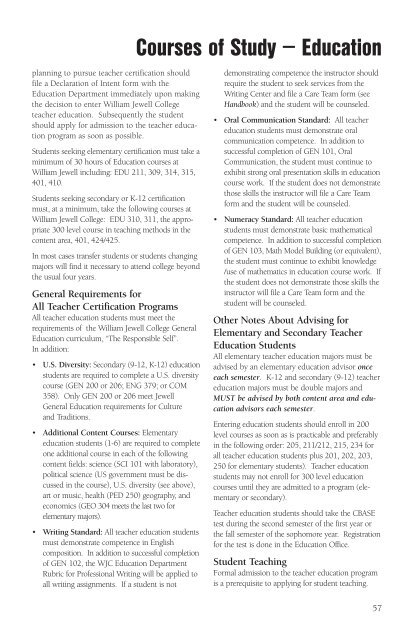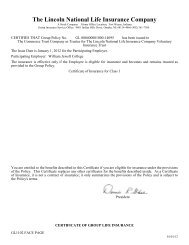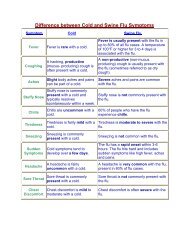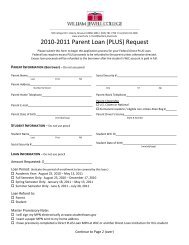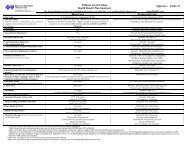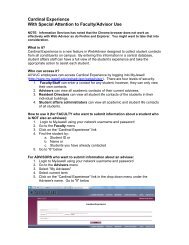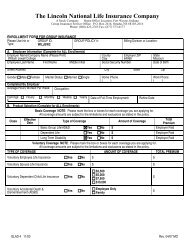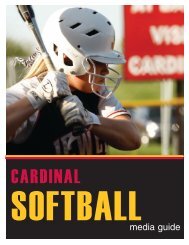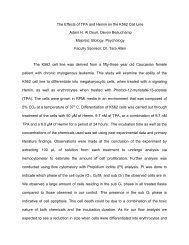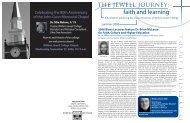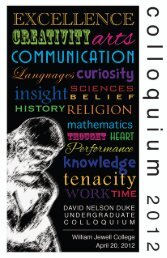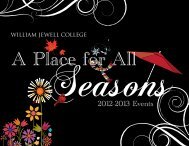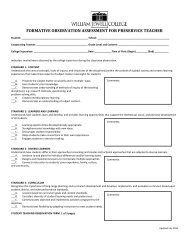Courses of Study - William Jewell College
Courses of Study - William Jewell College
Courses of Study - William Jewell College
Create successful ePaper yourself
Turn your PDF publications into a flip-book with our unique Google optimized e-Paper software.
planning to pursue teacher certification should<br />
file a Declaration <strong>of</strong> Intent form with the<br />
Education Department immediately upon making<br />
the decision to enter <strong>William</strong> <strong>Jewell</strong> <strong>College</strong><br />
teacher education. Subsequently the student<br />
should apply for admission to the teacher education<br />
program as soon as possible.<br />
Students seeking elementary certification must take a<br />
minimum <strong>of</strong> 30 hours <strong>of</strong> Education courses at<br />
<strong>William</strong> <strong>Jewell</strong> including: EDU 211, 309, 314, 315,<br />
401, 410.<br />
Students seeking secondary or K-12 certification<br />
must, at a minimum, take the following courses at<br />
<strong>William</strong> <strong>Jewell</strong> <strong>College</strong>: EDU 310, 311, the appropriate<br />
300 level course in teaching methods in the<br />
content area, 401, 424/425.<br />
In most cases transfer students or students changing<br />
majors will find it necessary to attend college beyond<br />
the usual four years.<br />
General Requirements for<br />
All Teacher Certification Programs<br />
All teacher education students must meet the<br />
requirements <strong>of</strong> the <strong>William</strong> <strong>Jewell</strong> <strong>College</strong> General<br />
Education curriculum, “The Responsible Self”.<br />
In addition:<br />
• U.S. Diversity: Secondary (9-12, K-12) education<br />
students are required to complete a U.S. diversity<br />
course (GEN 200 or 206; ENG 379; or COM<br />
358). Only GEN 200 or 206 meet <strong>Jewell</strong><br />
General Education requirements for Culture<br />
and Traditions.<br />
• Additional Content <strong>Courses</strong>: Elementary<br />
education students (1-6) are required to complete<br />
one additional course in each <strong>of</strong> the following<br />
content fields: science (SCI 101 with laboratory),<br />
political science (US government must be discussed<br />
in the course), U.S. diversity (see above),<br />
art or music, health (PED 250) geography, and<br />
economics (GEO 304 meets the last two for<br />
elementary majors).<br />
• Writing Standard: All teacher education students<br />
must demonstrate competence in English<br />
composition. In addition to successful completion<br />
<strong>of</strong> GEN 102, the WJC Education Department<br />
Rubric for Pr<strong>of</strong>essional Writing will be applied to<br />
all writing assignments. If a student is not<br />
<strong>Courses</strong> <strong>of</strong> <strong>Study</strong> – Education<br />
demonstrating competence the instructor should<br />
require the student to seek services from the<br />
Writing Center and file a Care Team form (see<br />
Handbook) and the student will be counseled.<br />
• Oral Communication Standard: All teacher<br />
education students must demonstrate oral<br />
communication competence. In addition to<br />
successful completion <strong>of</strong> GEN 101, Oral<br />
Communication, the student must continue to<br />
exhibit strong oral presentation skills in education<br />
course work. If the student does not demonstrate<br />
those skills the instructor will file a Care Team<br />
form and the student will be counseled.<br />
• Numeracy Standard: All teacher education<br />
students must demonstrate basic mathematical<br />
competence. In addition to successful completion<br />
<strong>of</strong> GEN 103, Math Model Building (or equivalent),<br />
the student must continue to exhibit knowledge<br />
/use <strong>of</strong> mathematics in education course work. If<br />
the student does not demonstrate those skills the<br />
instructor will file a Care Team form and the<br />
student will be counseled.<br />
Other Notes About Advising for<br />
Elementary and Secondary Teacher<br />
Education Students<br />
All elementary teacher education majors must be<br />
advised by an elementary education advisor once<br />
each semester. K-12 and secondary (9-12) teacher<br />
education majors must be double majors and<br />
MUST be advised by both content area and education<br />
advisors each semester.<br />
Entering education students should enroll in 200<br />
level courses as soon as is practicable and preferably<br />
in the following order: 205, 211/212, 215, 234 for<br />
all teacher education students plus 201, 202, 203,<br />
250 for elementary students). Teacher education<br />
students may not enroll for 300 level education<br />
courses until they are admitted to a program (elementary<br />
or secondary).<br />
Teacher education students should take the CBASE<br />
test during the second semester <strong>of</strong> the first year or<br />
the fall semester <strong>of</strong> the sophomore year. Registration<br />
for the test is done in the Education Office.<br />
Student Teaching<br />
Formal admission to the teacher education program<br />
is a prerequisite to applying for student teaching.<br />
57


